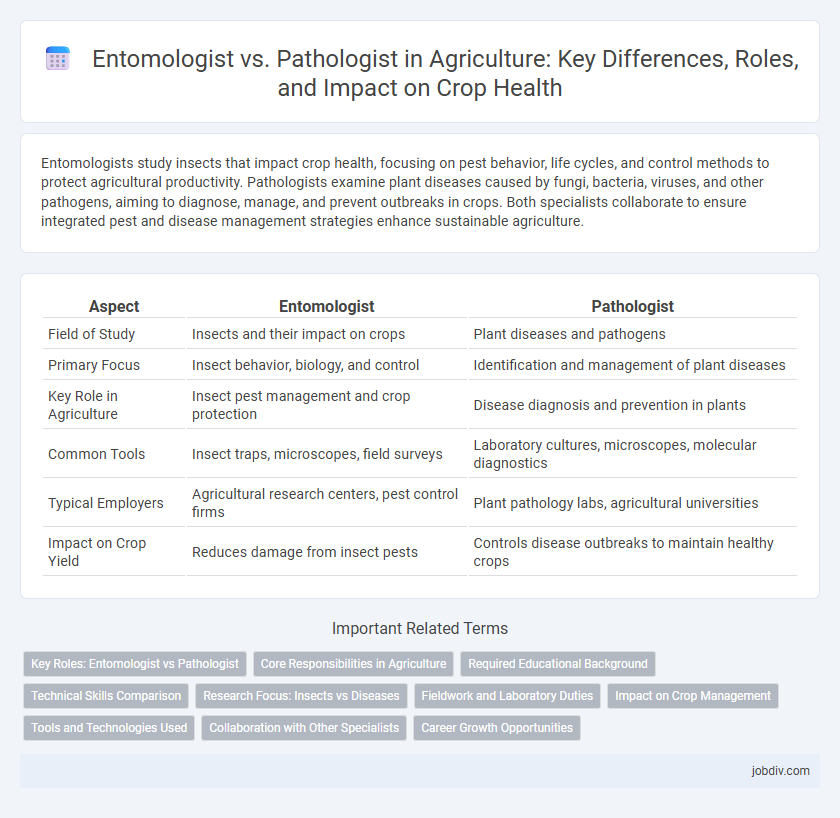Entomologists study insects that impact crop health, focusing on pest behavior, life cycles, and control methods to protect agricultural productivity. Pathologists examine plant diseases caused by fungi, bacteria, viruses, and other pathogens, aiming to diagnose, manage, and prevent outbreaks in crops. Both specialists collaborate to ensure integrated pest and disease management strategies enhance sustainable agriculture.
Table of Comparison
| Aspect | Entomologist | Pathologist |
|---|---|---|
| Field of Study | Insects and their impact on crops | Plant diseases and pathogens |
| Primary Focus | Insect behavior, biology, and control | Identification and management of plant diseases |
| Key Role in Agriculture | Insect pest management and crop protection | Disease diagnosis and prevention in plants |
| Common Tools | Insect traps, microscopes, field surveys | Laboratory cultures, microscopes, molecular diagnostics |
| Typical Employers | Agricultural research centers, pest control firms | Plant pathology labs, agricultural universities |
| Impact on Crop Yield | Reduces damage from insect pests | Controls disease outbreaks to maintain healthy crops |
Key Roles: Entomologist vs Pathologist
Entomologists specialize in studying insect behavior, biology, and interactions with crops to manage pest populations effectively, thereby reducing damage and increasing crop yield. Pathologists focus on diagnosing, monitoring, and controlling plant diseases caused by pathogens such as fungi, bacteria, and viruses to ensure plant health and prevent epidemics. Both experts play crucial roles in integrated pest and disease management strategies that sustain agricultural productivity.
Core Responsibilities in Agriculture
Entomologists in agriculture specialize in studying insect behavior, biology, and their impact on crops, focusing on pest identification, monitoring, and developing integrated pest management strategies. Pathologists concentrate on diagnosing and managing plant diseases caused by pathogens such as fungi, bacteria, and viruses to prevent crop loss and ensure plant health. Both experts collaborate to enhance crop protection, improve yield quality, and support sustainable agricultural practices.
Required Educational Background
Entomologists typically require a bachelor's degree in entomology, biology, or agricultural science, with advanced positions often necessitating a master's or Ph.D. specializing in insect biology and pest management. Pathologists in agriculture usually hold degrees in plant pathology, microbiology, or related fields, frequently pursuing graduate studies focused on disease diagnosis, microbial pathogens, and crop health management. Both careers demand comprehensive knowledge of biological sciences, but the emphasis differs: entomologists concentrate on insect species and their impact on crops, while pathologists specialize in plant diseases and pathogen control.
Technical Skills Comparison
Entomologists specialize in insect identification, behavior analysis, and pest management techniques, utilizing tools such as microscopes and pheromone traps for precise monitoring. Pathologists focus on diagnosing plant diseases through pathogen isolation, molecular diagnostics, and histopathological examinations to inform treatment strategies. Both professions employ laboratory diagnostics and data analysis, but entomologists prioritize insect-related controls while pathologists emphasize disease pathology and control measures.
Research Focus: Insects vs Diseases
Entomologists specialize in the study of insects, focusing on their behavior, lifecycle, and impact on crops and ecosystems, which is crucial for developing pest management strategies. Pathologists concentrate on plant diseases caused by fungi, bacteria, viruses, and other pathogens, aiming to diagnose, control, and prevent outbreaks that threaten agricultural productivity. Both fields contribute to sustainable agriculture by addressing biotic stressors affecting crop health and yield.
Fieldwork and Laboratory Duties
Entomologists primarily conduct fieldwork by surveying and collecting insect specimens to study their behavior, population dynamics, and impact on crops, while their laboratory duties involve identifying insect species and testing pest control methods. Pathologists focus fieldwork on sampling diseased plants and monitoring the spread of pathogens in agricultural environments, with laboratory responsibilities centered on diagnosing plant diseases through microscopy, culturing pathogens, and analyzing infection mechanisms. Both roles require integrated field observations and laboratory analyses to ensure effective crop protection and sustainable agricultural practices.
Impact on Crop Management
Entomologists specialize in identifying and managing insect pests that affect crop health, reducing yield losses through integrated pest management strategies. Pathologists focus on diagnosing and controlling plant diseases caused by fungi, bacteria, and viruses, implementing effective fungicide or bactericide treatments. Both disciplines are critical for sustainable crop management, enhancing productivity by minimizing biotic stress factors in agricultural systems.
Tools and Technologies Used
Entomologists utilize tools such as insect traps, pheromone lures, and digital imaging systems to monitor and study insect populations, leveraging molecular techniques like DNA barcoding for species identification. Pathologists employ technologies including microscopes, culture media, polymerase chain reaction (PCR) assays, and genomic sequencing to detect and analyze plant diseases caused by fungi, bacteria, viruses, and nematodes. Both disciplines increasingly integrate remote sensing, GIS mapping, and data analytics platforms to enhance precision agriculture and effective pest and disease management.
Collaboration with Other Specialists
Entomologists collaborate closely with plant pathologists to manage pest populations and disease outbreaks, integrating insect behavior and pathogen dynamics for effective crop protection strategies. This multidisciplinary approach enhances the development of sustainable pest and disease control methods, promoting agricultural productivity and environmental health. Joint research efforts and shared field data enable precise identification of threats and tailored intervention techniques in integrated pest management (IPM) programs.
Career Growth Opportunities
Entomologists specializing in agriculture analyze insect behavior and develop pest management strategies, with growing demand in sustainable farming and integrated pest management sectors. Pathologists focus on diagnosing and controlling plant diseases, with career growth driven by advancements in molecular diagnostics and crop protection technologies. Both fields offer expanding opportunities in research institutions, agribusiness companies, and governmental agencies dedicated to enhancing crop yield and food security.
Entomologist vs Pathologist Infographic

 jobdiv.com
jobdiv.com